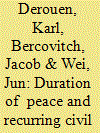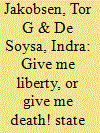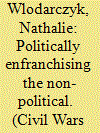|
|
|
Sort Order |
|
|
|
Items / Page
|
|
|
|
|
|
|
| Srl | Item |
| 1 |
ID:
089022


|
|
|
|
|
| Publication |
2009.
|
| Summary/Abstract |
Although recommendations for gender mainstreaming and the prevention of sexual exploitation and abuse in United Nations peace support operations have increased in recent years, a comparative analysis of different approaches towards these policy objectives remains wanting. As a result, the effectiveness of the UN guidelines for gender mainstreaming as expressed in Security Council Resolution 1325 has not yet been evaluated and debated academically. By comparing UN missions in Sierra Leone and Liberia, this article provides a summary of the current literature on UN policies on gender mainstreaming and sexual misconduct. Relying on interviews with mission staff, the article argues that although the effects of 1325 look promising, efforts to integrate gender perspectives and prevent sexual exploitation still suffer from staff, funding and enforcement deficiencies. More importantly, it reveals how urgently further field research and an active scholarly debate on UN policies on gender awareness and sexual misconduct are needed.
|
|
|
|
|
|
|
|
|
|
|
|
|
|
|
|
| 2 |
ID:
089014


|
|
|
|
|
| Publication |
2009.
|
| Summary/Abstract |
Civil wars in Southeast Asia and the Pacific are perhaps the most intractable in the world and thus merit special attention. We adopt a regional approach for our analysis of the duration of peace after civil war terminations. Our contribution is three-fold: First, we capture all dyads (rebel versus government) rather than lumping multiple dyads into one war. This is appropriate in a region where there are multiple conflicts in a country at any one time. Second, we test a new conflict termination dataset developed at Uppsala University. These data allow us to offer a fine-grained analysis not normally found in the civil war literature. Third, we employ a method specifically suited to recurring data in a duration setting. The results generally support our hypotheses that wars in the region are intractable in the face of negotiated settlements and longer wars increase the duration of the subsequent peace. Also, there is a tendency for the peace to become longer with each recurrence. The impact of longer wars is obscured unless repeated events are carefully treated as non-independent events.
|
|
|
|
|
|
|
|
|
|
|
|
|
|
|
|
| 3 |
ID:
089015


|
|
|
|
|
| Publication |
2009.
|
| Summary/Abstract |
This study searches for consensus findings in the burgeoning statistical literature on civil war termination. Several trends are identified: the final outcomes of civil wars are largely dependent on the military situation; the duration of civil wars, by contrast, depends to a great degree on contextual factors such as inter-ethnic relations, the fragmentation of violence, and economic incentives; while compromise settlements reduce the risk of post-war massacres, they take longer to achieve than military victories and are more likely to collapse into renewed warfare. These results also suggest an intervener's dilemma: while external military intervention can lead to compromise and prevent genocide, it also prolongs the killing and may increase the risk of war recurrence. Interveners appear to have more success after wars than during them. Several other puzzles emerge from the statistical results, which call for theoretical development and further qualitative and quantitative analysis.
|
|
|
|
|
|
|
|
|
|
|
|
|
|
|
|
| 4 |
ID:
089017


|
|
|
|
|
| Publication |
2009.
|
| Summary/Abstract |
Recent research on the causes of civil war seeks to identify whether group grievances, or opportunity for organisation, motivates rebellion. Similarly, scholars debate whether ethnicity matters in civil war due to group grievances or the opportunity to mobilise. We introduce the lack of empowerment rights, defined as social, political and economic empowerment directly and conditionally in models of civil war onset using novel methods and data. We find no direct effect of repression of rights on war, but higher ethnic fractionalisation increases the risk independently. Nonetheless, higher levels of repression condition the effects of ethnic fractionalisation in ways that maintain peace. State policies that dis-empower people under conditions of high fractionalisation actually reduce the chance of civil war. We do not find that high fractionalisation is only related to lower level armed conflict as some have suggested, but it seems to explain onsets of civil wars above 25 deaths but lower than 1,000 and conflict measured above 1,000 deaths for the period of study that our data allow. The conditional effects of repression and ethnic fractionalisation explain onsets at both levels of war. Our findings are generally unsupportive of the view that grievances due to lack of ethnic group rights drive civil war, but it seems that the opportunity to mobilise does.
|
|
|
|
|
|
|
|
|
|
|
|
|
|
|
|
| 5 |
ID:
089024


|
|
|
|
|
| Publication |
2009.
|
| Summary/Abstract |
This article considers the nature of the Civil Defence Forces (CDF) in Sierra Leone as a fighting force, and some of the challenges they faced for Disarmament, Demobilization and Reintegration (DDR), as well as the challenges posed by a group like the CDF to the DDR process. It considers some initiatives to educate the fighters about democracy, reconciliation and their associated responsibilities that began already during the civil war, as well as mechanisms that were created for the peaceful resolution of conflict by the CDF. Part of these initiatives have survived into the post-conflict period and continues to provide access to redress, but also a framework for political engagement. The article also considers how some of these initiatives undertaken during the war helped facilitate the transformation of the CDF into active civilian members of society, drawing some conclusions from this case for political enfranchisement more broadly.
|
|
|
|
|
|
|
|
|
|
|
|
|
|
|
|
| 6 |
ID:
089020


|
|
|
|
|
| Publication |
2009.
|
| Summary/Abstract |
Most research on civil wars focuses upon the variables that contribute to the outbreak of internecine strife. By contrast, this article examines a case study where, despite the clear potential for such violence, the institutions of the state have been strong enough to forestall internal conflict: Israel. The potential for civil strife is most closely associated with the Jewish settler movement which, regarding territorial concessions to the Palestinians as an apostasy, has come to directly challenge the authority of the State. While acknowledging that key variables that would normally presage internal violence are certainly present in the Israeli polity, the article identifies three key variables that deny agency to violent extremism: the sense of solidarity to which the Jewish people are committed, the perception of existential threats facing Israel and disunity within the camp of the potential rebels.
|
|
|
|
|
|
|
|
|
|
|
|
|
|
|
|
|
|
|
|
|